Exclusive: Former NC State star Tommy Burleson on 1974 title, terrifying Olympic ordeal
- Oops!Something went wrong.Please try again later.
- Oops!Something went wrong.Please try again later.
- Oops!Something went wrong.Please try again later.
- Oops!Something went wrong.Please try again later.
Tommy Burleson was the literal centerpiece of one of the best college basketball teams in the history of the Carolinas — the 1974 N.C. State Wolfpack.
Burleson, point guard Monte Towe and high-flying forward David Thompson led that N.C. State team to a national championship, ending UCLA’s streak of seven consecutive NCAA titles in the national semifinal in double overtime and then beating Marquette in the final. Burleson is the star of this week’s “Sports Legends of the Carolinas” interview.
Anxious to christen Burleson as college basketball’s tallest player, N.C. State listed him at 7-foot-4, which helped him land the cover of Sports Illustrated. Burleson wasn’t quite that tall but he was also a far more athletic center than most people assumed. A mountain of a man, Burleson grew up in a tiny town called Newland in the mountains of western North Carolina. As a teenager, Burleson was nicknamed the “Newland Needle” due to his skinny build.
Burleson played for the U.S. Olympic team in 1972, where he had a terrifying experience. He was later named the two-time MVP of the ACC tournament and starred in one of the greatest college basketball games ever in the 1974 ACC tourney final against Maryland — a 103-100 Wolfpack win.
After a seven-year NBA career that ended in 1981, Burleson returned to North Carolina and his beloved mountains. Now 71, he’s been a larger-than-life presence in his home county of Avery, where he served as a county planner for decades and also ran a Christmas tree farm with his three sons for years that helped fund his missionary work.
This interview has been edited for clarity and brevity. For a much fuller version, check out the Burleson episode on the “Sports Legends of the Carolinas” podcast.
Scott Fowler: What was growing up like in Avery County in western North Carolina?
Tommy Burleson: It was in a very rural area. Agriculture dominated. At 10 years old, I was working for 25 cents an hour in cabbage fields and then as I got bigger, that went up to 45 cents an hour. I was really involved in 4-H and FFA and that was where I fell in love with N.C. State, when I was down there (for farming demonstrations and events).
I was able to see Glassy the Cow for the first time there in front of Reynolds. Of course that was the corner where Coach (Norm) Sloan’s office was. And as a freshman, I was about 14 years old and I was about 6-8. I walked in with my uncle and introduced myself. (Assistant coach Charlie) Bryant said: “He’s 6-8, coach.”
And Coach Sloan said: “Well, we’ve got a ton of 6-8 guys.”
And he said: “But he’s only 14!”
So Coach Sloan came out and he greeted me, and it was really nice, and I just sort of fell in love with the school.
SF: You’ve been noticed for your height for most of your life. What was the height you were listed at at N.C. State and what was your true height?
TB: Coming out of high school, I was 7-1 and of course my idol was Lew Alcindor (later known as Kareem Abdul-Jabbar and listed at 7-2). And Artis Gilmore, who was listed at 7-2 also. So I was just anxious for the day when I would be listed at 7-2.
Frank (Weedon, N.C. State’s sports information director at the time) treated me like a circus act, and he listed me at 7-4.
When I was measured in the (1972) Olympics, I was 7-2 1/2. When I was measured in the NBA combine, I was like 7-2 and a quarter. The first time I ever played against Lew Alcindor as a (Milwaukee) Buck, we were like boxers. We walked up to each other and we measured each other up to see who’s bigger. And the first words Lew Alcindor ever said to me were: “You’re not 7-4.”
And I said, “I know, I’m 7-2.”
I wanted to be known for my ability. I had a 29-inch vertical (jump). I led my high school in free-throw shooting at 87%. My shooting percentage at N.C. State was 56.4.
Right now I’m not 7-2, though. More like 7-1.
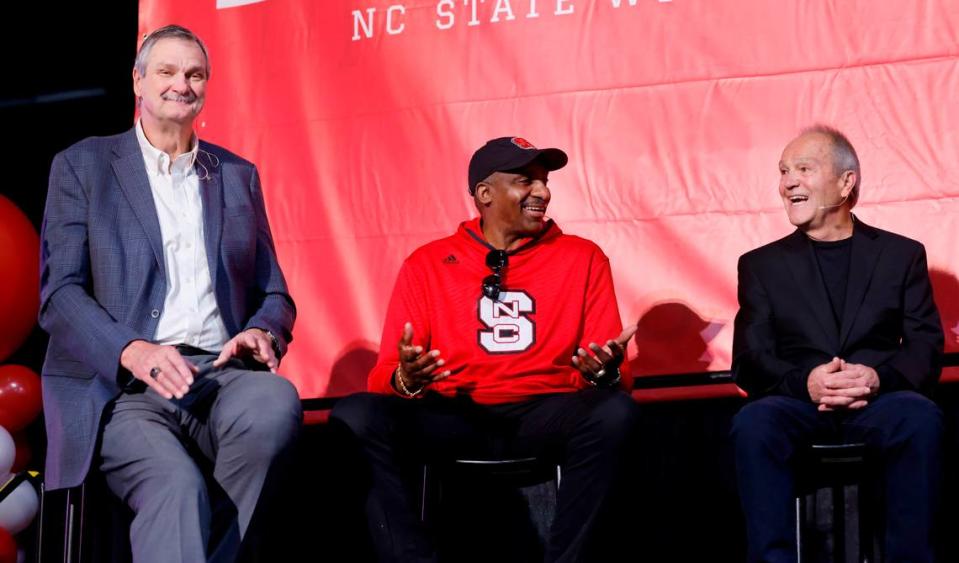
SF: In 1974, as a senior, you helped lead N.C. State to a national championship. Describe the four major personalities on that team — yourself, Monte Towe, David Thompson and Coach Sloan — and how you meshed.
TB: Well, I guess it was perfect, because we won a national championship (Laughs).
David and I played in the same high school conference and we wanted to play together in college. We were very good friends and are still great friends today. David is very calm. He led by example. Monte was that little military leader like Coach Sloan.
And Coach Sloan was military. He was what I needed. He was very strict on me. ... Monte ran the offense. I ran the defense. And as (former UCLA center) Bill Walton has said, David Thompson was the best player of our era.
SF: To even get to that NCAA tournament you won, though, you had to win a game that is often called the best ACC game ever played — the 1974 ACC tournament final, where you had 38 points and 13 rebounds. Why do you think people remember that game so vividly nearly 50 years later?
TB: There were only 25 berths in the NCAA tournament at the time, and that game is what prompted the NCAA to go to a bigger field. So that was part of it. And we were the only team in ACC history to go undefeated in conference and tournament play for two years in a row (N.C. State was on probation in 1973 and barred from playing in the NCAA tourney). So that was part of it, too.
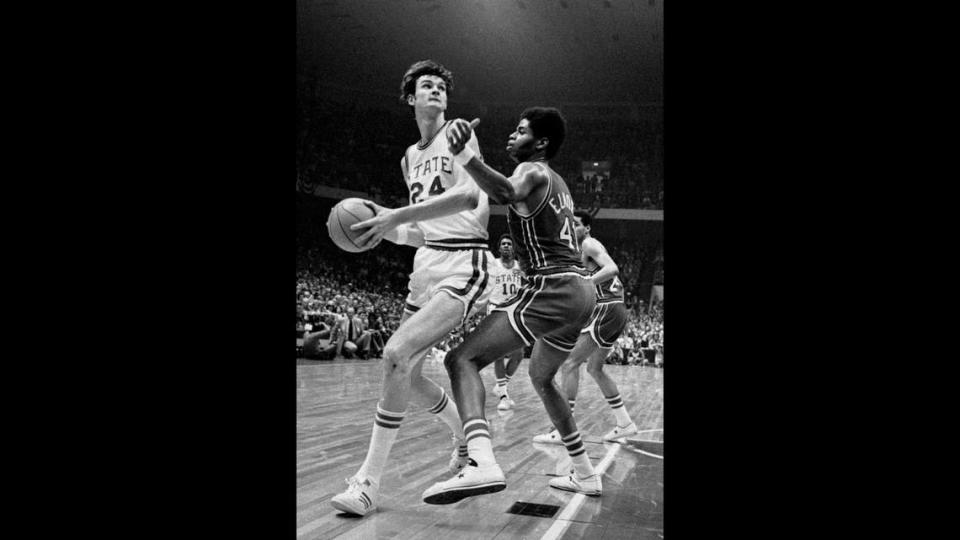
SF: The score was 103-100, with no shot clock and no three-point shot. How did that happen?
TB: Well, Maryland had a lot of great athletes and they liked to score. And we had a lot of great athletes and we liked to score. So there was a lot of transition, a lot of up and down. The game was really at a fever pitch.
And of course we went into overtime. And in overtime, I’m looking down at the Maryland bench and I’m seeing Len Elmore pop the (smelling salts) and Tom McMillen has his hands on his knees and he’s bent over at the waist, showing they were tired.
Coach Sloan said, “We’ve got to pull this out.” And I said: “Don’t worry. We’ve got this.”
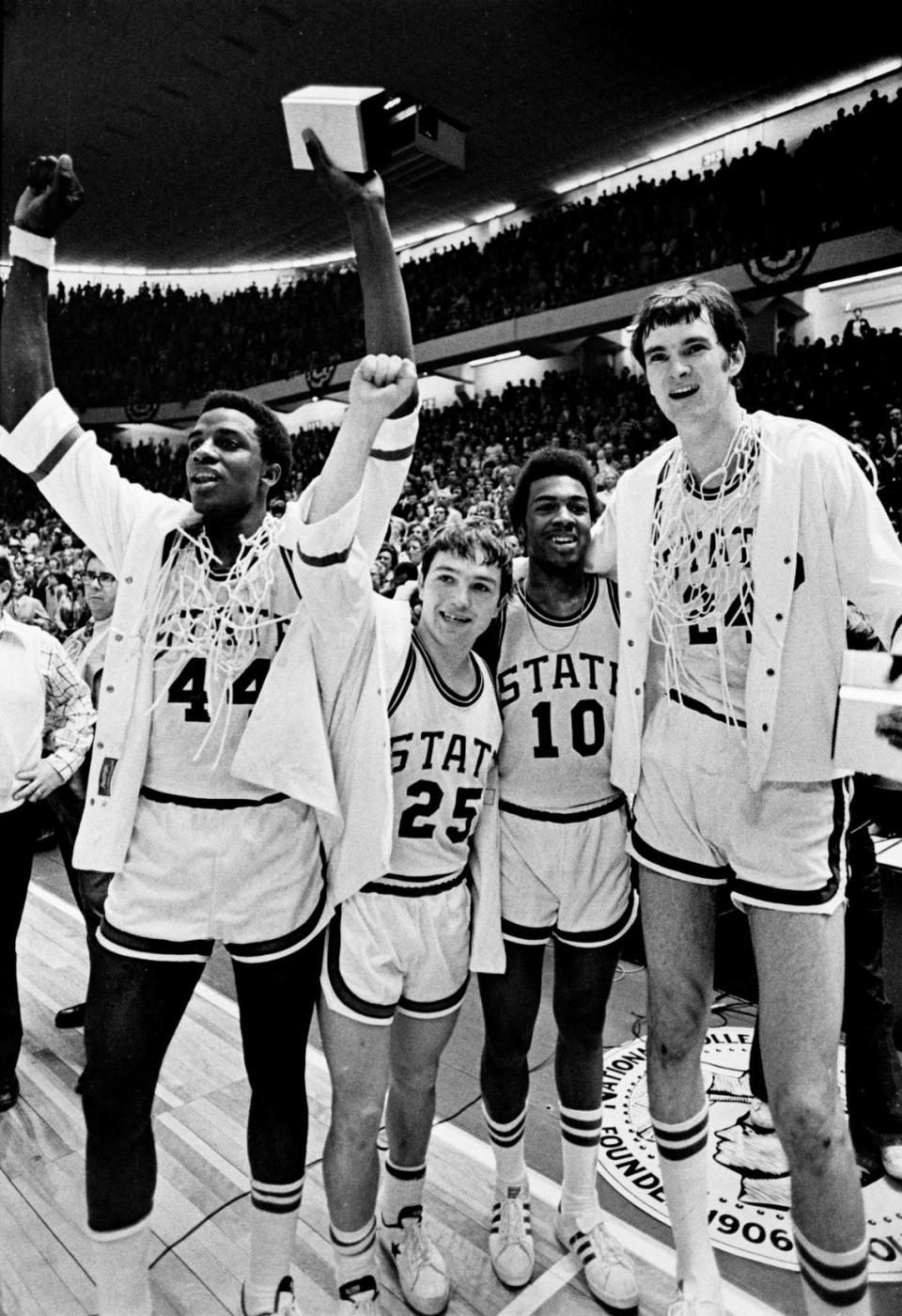
SF: In 1972, as a 20-year-old Olympian, you had a terrifying experience at the Olympics after Palestinian terrorists infiltrated the Olympic Village in Munich, Germany, and took numerous Israeli Olympians as hostages, many of whom wound up murdered. Describe what happened after the hostages had been taken and you returned to Olympic Village.
TB: I was on the train back to the Olympic Village, in the very last car. The Olympic station was so full. Before (the hostages were taken), you needed only one piece of ID. Now you needed three, and so there was a logjam of 200-300 people.
But we were let out — myself and two Brazilian basketball players — behind the barricade somehow. And our building was just right there. I said: “Do you want to cut across the parking lot?” And they said, “Sure, lead the way.”
So we went across the parking lot. As we’re entering the garage, a German soldier comes up to me and says, “Young man, you’re in the wrong place at the wrong time.”
I said, “What?”
And he said: “We’re bringing out the hostages right now.”
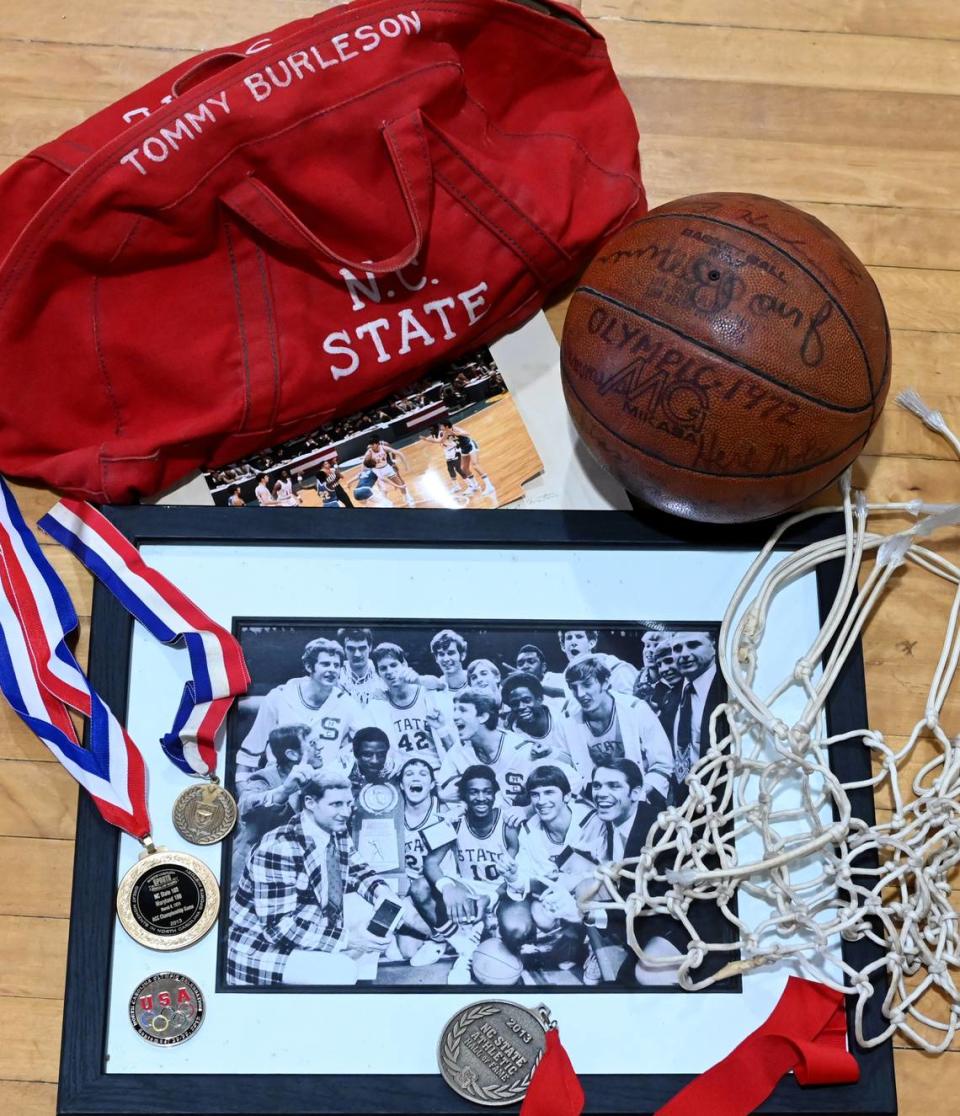
I look to my left and the two Brazilian players were lying face down, with guns in their back. And I saw a terrorist step out from behind the wall. The German soldier sticks a gun in the back of my head and says: “Face the wall. Now!”
I can close my eyes and see those blemishes in that concrete right now.
And then as the hostages start walking behind me, I can hear the young men, and a couple of them were crying. I can hear all of this shuffling behind me.
I wake up at night sometimes in fright, in terror, dreaming about those young men, because within 45 minutes they are all going to be dead.
SF: So the German soldier that was part of the Olympics’ security team that had his gun pressed into the back of your neck — he was actually doing that for your own good?
TB: Yes. I had a USA coat on. This was Black September (the Palestinian terrorist organization). If they had seen that “USA,” they could have said, “We want him, too” and put me on the bus with (the hostages).
It could have been catastrophic for me. But God was protecting me. God had angels there.
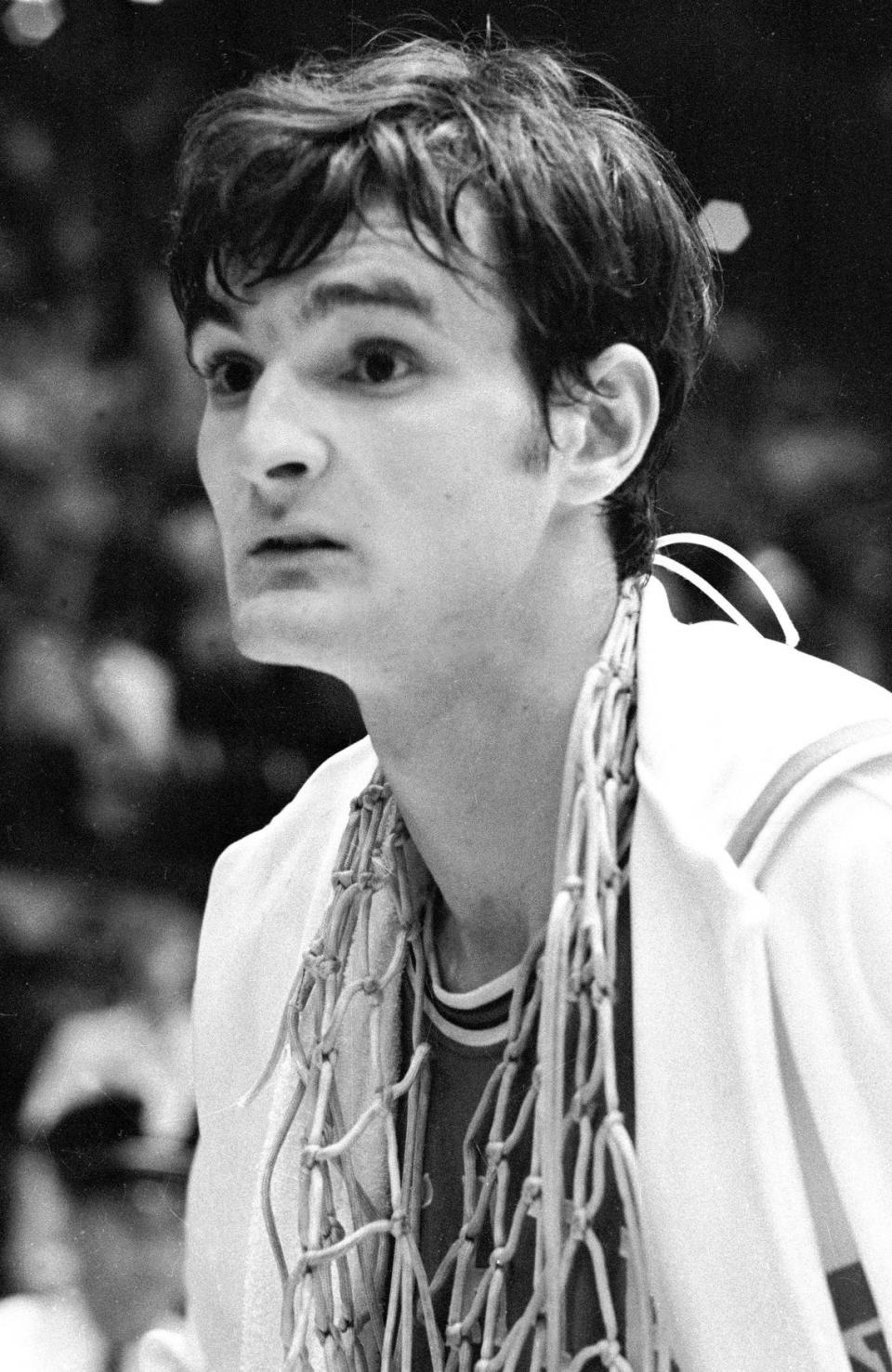
SF: Once your NBA career ended in 1981, what have you done with your life?
TB: I rededicated my life on June 23, 1982, to Jesus Christ. I got married. Denise and I have three sons. Seeing that first boy’s face and realizing that he’s depending on me for everything — that is a moment you realize people are relying on you.
I moved back to my hometown. I had a little hardware store and worked there for a while. And then I was able to get a job as a building inspector and moved from building inspector to county planner. I was a county planner for 26 years.
The way my NBA career ended wasn’t (ideal), but God had a plan for me, and had a job waiting for me, and had a life waiting for me. I’ve had a basketball camp for 40 years now. We teach fundamentals. And there’s fundamentals in everything you do: Everything from education, to basketball to living your life, to how you treat people and how you want to be treated.
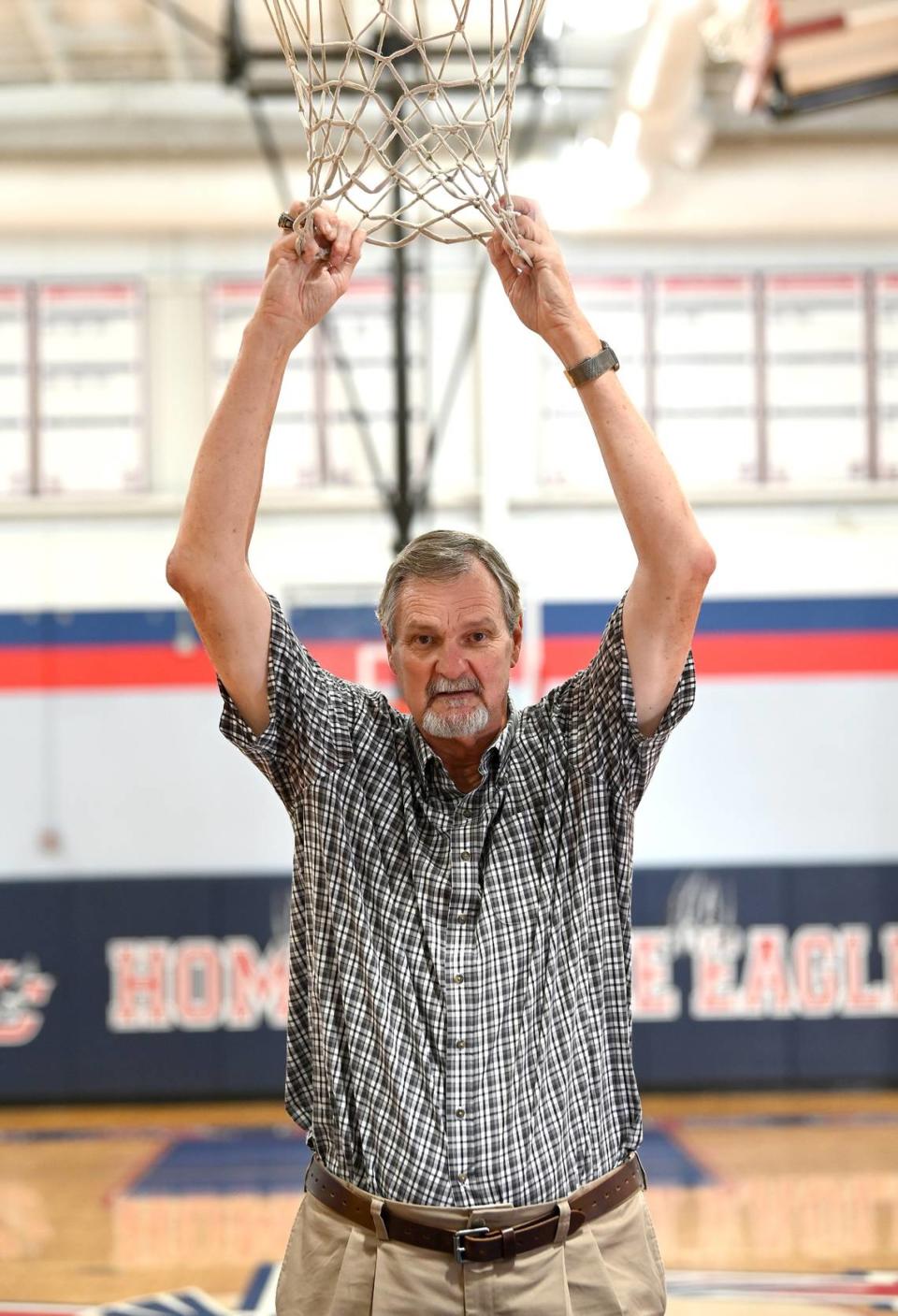
SF: Of all your trophies and plaques, what is your favorite?
TB: My very favorite trophy? I competed in the western North Carolina livestock show for many years. And in my high school senior year, I had a really good Angus beef (cow). He weighed about 1,400 pounds and I showed him. And I received the showmanship award, but he was the grand champion.
Back then you didn’t get participant trophies. If you received a trophy, you got it for accomplishing some feat. And I was just tickled to death with my grand champion of beef that year.
SF: You mentioned that you’re working on a book, a memoir of your life. What do you plan to call it?
TB: “Play On.”
Life after basketball is a big part of the book. There are so many stories I can tell where players implode once their basketball career is over. They don’t know what to do. You’re relying on basketball so much that once you have to go back to your education and your skills, what do you have? You have to prepare yourself for life after basketball.
For much more from this interview as well as other “Sports Legends” guests like Steph Curry, Roy Williams, Thomas Davis, Mike Krzyzewski, Bobby Richardson and Dawn Staley, check out the “Sports Legends of the Carolinas” podcast.
The “Sports Legends of the Carolinas” coffee table book debuts at Thanksgiving and is now available to pre-order — at a 20% discount for a limited time — at SportsLegendsBook.com.


